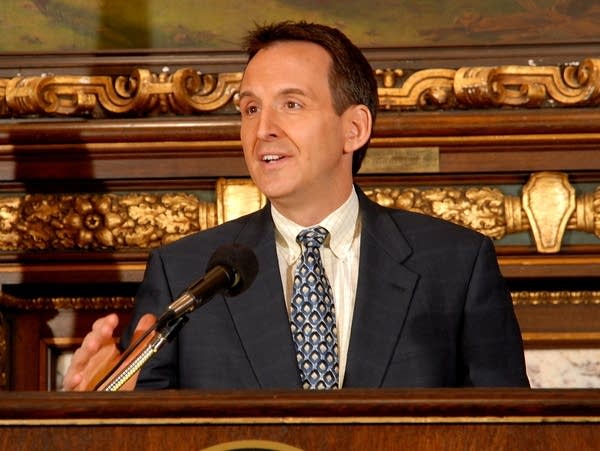Pawlenty to use line veto power to balance budget

Instead, Pawlenty announced he'll balance the budget on his own if a deal can't be reached. Democrats call Pawlenty's actions a "go it alone strategy."
For the past week, Pawlenty has criticized Democrats for sending him budget bills with no plan to pay for them. But now, he says he'll sign those bills and retool them to his liking.
"I want to be clear," Pawlenty said. "There is going to be no special session. There's going to be no government shutdown. This will be over on Monday midnight."
Pawlenty says he'll trim down the budget bills using his line-item veto authority. He took his first action last night, eliminating a health care program for low-income Minnesotans the second year of the budget. In fiscal year 2011, Pawlenty cut full funding for General Assistance Medical Care -- $381 million in all.
Create a More Connected Minnesota
MPR News is your trusted resource for the news you need. With your support, MPR News brings accessible, courageous journalism and authentic conversation to everyone - free of paywalls and barriers. Your gift makes a difference.
Rep. Tom Huntley, DFL-Duluth, said he's unhappy with Pawlenty's line-item veto. He said it will devastate hospitals that treat low income patients.
"GAMC was basically invented to save hospitals who treat these people, and have to treat them if they come into the emergency room," Huntley said. "And so it's weighted towards those hospitals who have these kinds of patients."
Pawlenty also line-item vetoed several projects from the Economic Development budget bill. Most notably, $1.25 million for the Minnesota TV and Film Board's "Snowbate" program, used to provide incentives to attract movies and commercial production.
The line-item vetoes are the first of what could be many cuts over the next year. Pawlenty said he plans on moving forward with his plan to cut government spending on his own if a budget deal isn't reached.
When the two-year budget begins on July 1, Pawlenty said he will then use his emergency authority to cut spending to balance the budget. That process is known as unallotment.
"It seems a little bullying."
"We're going to take action to make sure this session ends on time with a balanced budget," Pawlenty said. "I will do that. If the DFL Legislature is not willing to do that in conjunction with us, I will use executive powers to do it without them."
The governor said he believes a budget agreement with DFL lawmakers is possible before Monday's deadline. If that doesn't happen, he'll cut the two-year budget to $31 billion. That's about $3 billion less than the budget bills lawmakers sent to him.
Pawlenty and Democrats are mostly at odds over how to raise $1 billion in revenue. Pawlenty has proposed borrowing against future tobacco payments. DFLers want income tax hikes on the wealthiest Minnesotans, and an increase in the alcohol tax. Pawlenty said he won't support any tax increases put forward by DFLers.
Pawlenty said higher education, health and welfare programs and aid to local governments are possible targets for unallotment. He also said he will likely delay school payments.
The move clearly angered House DFLers.
"Frankly, it seems more like a threat to me," DFL House Speaker Margaret Anderson Kelliher said. "It seems a little bullying."
Kelliher dubbed Pawlenty "Governor go it alone" after he made his announcement. Kelliher said Pawlenty would cut 10 times more than any other governor has done through the unallotment process. She also insisted that the governor provide greater detail on which state programs could be cut.
"There will be no public hearings. There will be no public input," said Kelliher. "There will just be a governor alone, with unelected people whispering in this ear of what to cut and what not to cut. Minnesotans expect better."
At this point, DFL lawmakers have only a few options. They can negotiate with the governor and reach a budget deal. If they don't reach a deal, they can let him unallot, or they can try to override his veto of a $1 billion tax bill.
Republican House Minority Leader Marty Seifert said that won't happen. He said Democrats should come back to the bargaining table.
"The door is open and the phone is on if the Democrats are interested in working on a balanced budget," Seifert said.
Interest groups are holding out hope for a budget deal. Hospitals and local governments have been the most concerned and vocal over the governor's initial budget plan.
Wadena Mayor Wayne Wolden said it would be devastating to cities if Pawlenty cuts aid to local governments.
"It means their taxes will increase and their services will decrease," Wolden said. "Services like police, fire, parks and streets. It's all in jeopardy."
If Pawlenty uses his unallotment authority, it would be the second time in seven months that he's cut spending. In December, he drained the state budget reserve and cut spending to fix a $426 million shortfall. He also cut $281 million in 2003.
